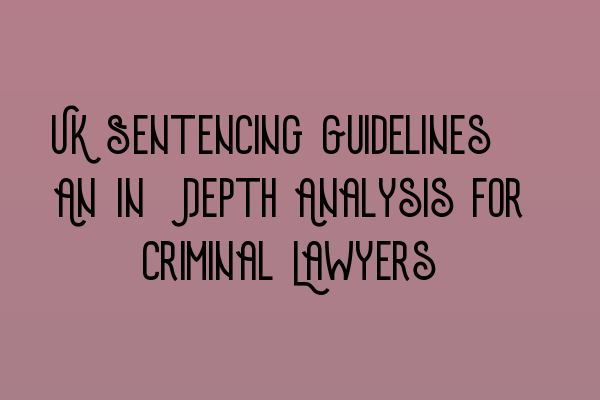As a criminal lawyer in the UK, understanding the intricacies of sentencing guidelines is crucial to effectively representing your clients and achieving the best outcomes in their cases. Sentencing guidelines provide a framework for judges to determine the appropriate punishment for criminal offenses, taking into account the severity of the offense and the individual circumstances of the defendant.
Why are Sentencing Guidelines Important?
The UK Sentencing Guidelines play a vital role in the criminal justice system as they promote consistency and transparency in sentencing. By providing clear guidelines, they ensure that similar offenses are treated similarly, regardless of where in the country the case is being heard or which judge is presiding over it. This helps to maintain public trust in the system and ensures fairness for all parties involved.
For criminal lawyers, a thorough understanding of the sentencing guidelines is essential for several reasons. Firstly, it allows you to assess the potential range of sentences your client may face if convicted of a particular offense. This enables you to advise them on the realistic prospects of acquittal or mitigation, helping them make informed decisions.
Furthermore, familiarity with the guidelines helps you present your client’s case persuasively during sentencing hearings. By highlighting relevant factors and mitigating circumstances, you can advocate for a more lenient sentence within the parameters set by the guidelines.
An Overview of the UK Sentencing Guidelines
The UK Sentencing Guidelines cover a wide range of offenses, from minor offenses such as shoplifting or drug possession to more serious offenses like rape, robbery, or manslaughter. The guidelines provide detailed information on the factors that should be taken into account when determining an appropriate sentence.
Some of the key factors considered include:
- The seriousness of the offense
- The culpability of the offender
- The harm caused or intended
- The impact on the victim
- Any aggravating or mitigating factors
- The offender’s previous convictions, if any
- Any remorse or willingness to make amends
Each offense has its own specific guidelines, which set out different sentencing ranges depending on the severity of the offense and the culpability of the offender. The guidelines also consider factors such as the defendant’s age, mental health, or previous good character.
It’s important to note that the guidelines are just that – guidelines. Judges still have discretion to deviate from them in exceptional circumstances, but they must provide clear and cogent reasons for doing so.
Staying Informed and Prepared
As a criminal lawyer, staying up-to-date with the latest developments in UK criminal laws and guidelines is crucial for providing effective representation to your clients. Regularly attending workshops and seminars on criminal practice can expand your expertise and help you stay ahead in this ever-evolving field.
Our SQE Criminal Law & Practice Law UK offers workshops and seminars that cover a wide range of topics, including sentencing guidelines, evidence rules, fraud and financial crimes, and more. By attending these events, you can enhance your knowledge and network with other legal professionals, ultimately improving your ability to navigate the complexities of criminal law.
To stay informed about the latest updates in UK criminal laws, our article on “Updates in UK Criminal Laws: Staying Informed and Prepared” provides valuable insights and resources to help you keep pace with changes in legislation and case law.
Enhancing Your SQE Criminal Law Study Group Experience
If you’re currently studying for the SQE Criminal Law exams, joining a study group can greatly enhance your learning experience. Engaging in group discussions, sharing resources, and receiving feedback from fellow students can deepen your understanding of the subject matter and improve your exam performance.
Our article on “Enhancing Your SQE Criminal Law Study Group Experience” offers valuable tips and strategies to make the most of your study group, ensuring a productive and collaborative learning environment.
Going Beyond Sentencing Guidelines
While sentencing guidelines play a significant role in criminal law, understanding other aspects of the legal process, such as criminal evidence rules, is equally important. Our article on “Decoding Criminal Evidence Rules: A Detailed Analysis” provides a comprehensive breakdown of the rules governing the admission and exclusion of evidence in criminal trials.
Additionally, if you have a specific interest in fraud and financial crimes, our article on “Deep Dive into Fraud and Financial Crimes in the UK” offers an in-depth exploration of this complex area of criminal law.
By delving into these related articles, attending workshops and seminars, and continuously expanding your knowledge, you can sharpen your skills as a criminal lawyer and provide exceptional legal representation to your clients.
Remember, the key to success in criminal law lies in staying informed, staying prepared, and staying committed to professional growth.
